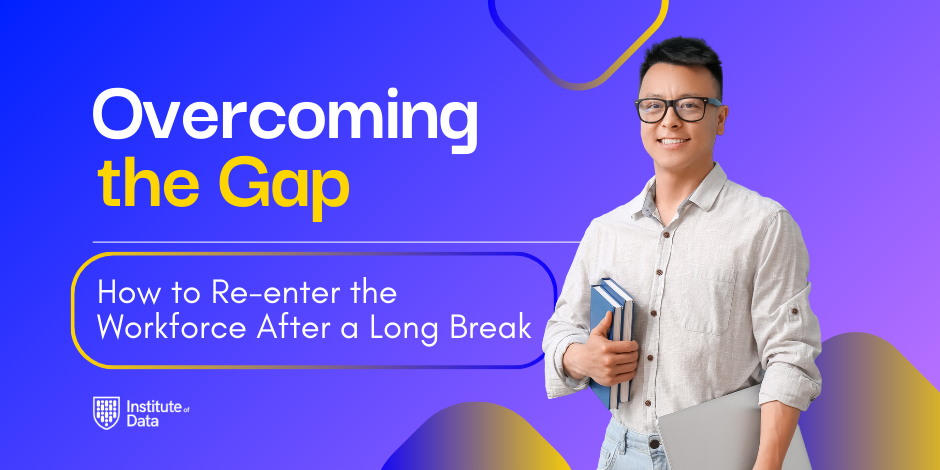How to Re-enter the Workforce After a Long Break

Stay Informed With Our Weekly Newsletter
Receive crucial updates on the ever-evolving landscape of technology and innovation.
Returning to work after a lengthy break can be a daunting prospect.
It’s not just about updating your CV and applying for jobs.
There are many challenges to overcome and preparations to make before re-entering the workforce.
In this article, we provide invaluable insights to help you successfully navigate how to re-enter the workforce after a long break.
Re-enter the workforce after a long break: Understanding the challenges

The psychological impact of a career break
After taking a long break from work, it’s normal to experience a sense of self-doubt and apprehension.
Many individuals struggle with inadequacy and fear that their skills are outdated.
Addressing these concerns head-on and focusing on rebuilding confidence is essential.
Conversely, returning to work after an extended absence can also bring excitement and anticipation.
Engaging in meaningful work again and contributing to a team can be invigorating.
That’s why positively embracing this new chapter can help you navigate the challenges you might face on the journey ahead.
The practical obstacles to re-employment
Aside from the psychological aspects, there are several practical challenges to consider when re-entering the workforce.
Technological advancements, changes in industry practices, and shifting job market demands may affect your ability to secure a position.
Developing a clear strategy and researching industry trends will help you overcome these obstacles.
As it always has, networking plays a crucial role in overcoming practical obstacles to re-employment.
This is why it’s important to build connections within your industry.
Also, attending industry events can open up opportunities and provide valuable insights into the current job market landscape.
Leveraging these connections can help bridge the gap between your previous experience and potential employers’ current requirements.
Preparing yourself for a triumphant return
Updating your skills and knowledge
One of the first steps to re-entering the workforce is evaluating your current skill set.
Identify gaps or areas requiring improvement and consider undertaking relevant degrees, courses or certifications to upskill.
This will not only enhance your marketability but also boost your confidence.
Continuing professional development is essential in today’s rapidly evolving job market.
By staying abreast of the latest industry trends and technologies, you demonstrate your commitment to growth and adaptability to potential employers.
Consider joining webinars, workshops, or industry conferences to broaden your knowledge and skills.
Rebuilding your professional network
Reach out to former colleagues and utilise online professional platforms like LinkedIn to reconnect and expand your network.
Building robust professional relationships can open doors to potential job opportunities.
Networking with existing and new people is not just about making connections; it’s also about nurturing and maintaining them.
A strong network can provide support, guidance, and even referrals when you are ready to re-enter the workforce.
Tailoring your job search strategy
Highlighting transferable skills in your CV
When preparing your CV, highlight the transferable skills relevant to the job you’re applying for.
Emphasise your abilities and experiences that can be seamlessly applied to a new role, even if acquired during your career break.
Employers value transferable skills as they demonstrate your adaptability and versatility in different work environments.
For example, communication, problem-solving, and leadership skills can be applied across various roles and industries.
By showcasing these skills on your CV, you can make a strong case for your suitability for the job.
Addressing the employment gap in interviews
Honesty is key during interviews when addressing the employment gap.
Instead of trying to hide or downplay it, emphasise the personal growth and skills development you gained during your break.
Showcase how your experiences have prepared you for the role you are seeking.
Employment gaps are typical for various reasons, such as taking time off to care for family members, pursuing further education, or personal health reasons.
It’s essential to frame your career break positively, focusing on how it has enriched your skills and perspective.
Demonstrating your ability and resilience to overcome challenges can reassure employers of your readiness to re-enter the workforce.
If you decide to study one of the Institute of Data’s tech programmes you’ll have access to the Institute of Data’s Job outcome programmes too.
The Institute of Data’s Job Outcomes Programme, helps students into new careers with dedicated, individualised support from experienced career coaches who are experts in understanding what helps professionals land jobs in the tech space.
Navigating the modern job market
Utilising online job platforms
The internet has transformed the job market, and online platforms have become a valuable resource for job seekers.
Utilise reputable job websites, set up job alerts, and regularly check for new opportunities.
Online platforms offer a convenient and efficient way to search for vacancies and submit applications.
Moreover, to increase your chances of success, you must tailor your CV and cover letter to each job application.
Illustrate your relevant experience and skills that match the job requirements.
Personalising your application shows the employer that you are genuinely interested in the position and have taken the time to understand their needs.
Understanding the role of social media in job hunting
Social media platforms like Twitter and LinkedIn have become increasingly important in the job search.
Ensure your online presence is professional and up-to-date.
Consider creating a personal brand on social media by sharing content related to your interests.
This can help you establish yourself as a thought leader and attract the attention of potential employers.
Engaging with industry influencers and joining online communities can expand your network and open new job opportunities.
Maintaining resilience during the job search

Dealing with rejection and setbacks
Job hunting can be a rollercoaster ride, and rejection is a part of the process.
It’s crucial to develop resilience and not let setbacks deter you.
Learn from each experience, seek feedback, and keep a positive mindset. Remember that perseverance and persistence are key to achieving success.
Adapting to the changing job market
As the job market evolves, staying adaptable and open to new opportunities is important.
Keep abreast of industry trends, update your skills regularly, and be willing to explore different career paths.
Embracing change and being flexible can increase your chances of finding the right job.
Job searching can be a time-consuming and tiring process, but it’s essential to stay motivated throughout.
Establish a routine, set goals, and celebrate small wins.
Surround yourself with a support network of friends, family, or career coaches who can provide encouragement and guidance.
Utilising networking and online resources
In today’s digital age, networking has become more accessible through online platforms such as LinkedIn and professional forums.
Use these resources to connect with industry professionals, attend virtual events, and showcase your skills and experience.
Building a solid online presence can significantly enhance your job search efforts.
Conclusion
Re-entering the workforce after a long break requires careful planning, preparation, and resilience.
By understanding the challenges involved, updating your skills, tailoring your job search strategy, and maintaining motivation, you can overcome the gap and successfully re-establish your career.
Remember, pursuing your professional goals and contributing meaningfully to the workforce is never too late.
Want to achieve your career goals and aspirations?
Visit the Institute of Data to learn how our programmes can unlock the keys to your tech career success.
Ready to learn more about our programmes? Contact our local team for a free consultation.





